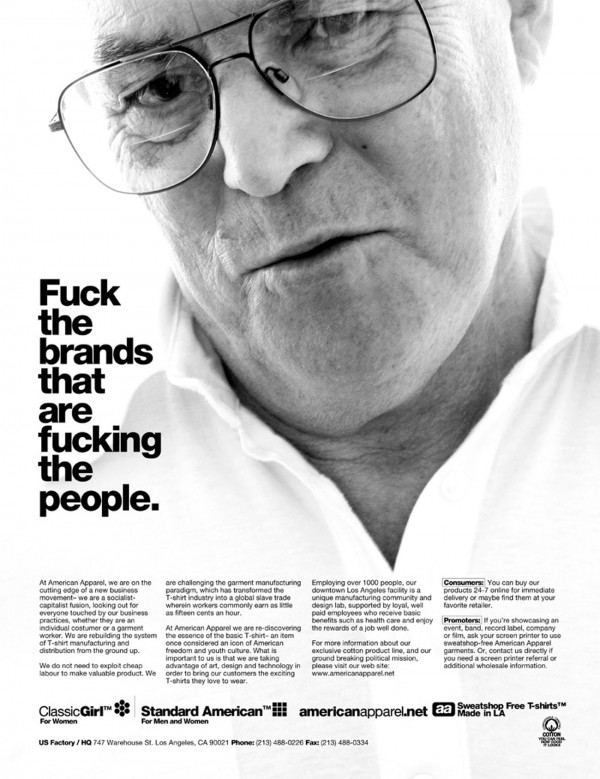 LOS ANGELES TIMES: The change of accountants “was definitely not anything sinister,” Schey said in an interview. “It has nothing to do with them coming across evidence of fraud or anything of that nature.” American Apparel disclosed July 28 that Deloitte had resigned as the company’s accountant. The apparel firm noted that Deloitte had reported previously that the company had weaknesses in its internal financial reporting controls. The clothing firm also said Deloitte had told it that further investigations might affect the reliability of its previous audit reports and the underlying financial statements for 2009. Word of the subpoena came as the firm also issued a warning that its second-quarter earnings are expected to show a loss and said that in the coming year there is “substantial doubt that the company will be able to continue as a going concern.” The company did not report earnings Tuesday but said it expected quarterly operating losses of $5 million to $7 million, compared with a profit of $7.3 million a year earlier. Known for its racy advertising and colorful basics, American Apparel has been plagued over the last year by falling sales, plummeting earnings and run-ins with immigration and financial regulatory authorities. The company also said Tuesday that it might be delisted from the New York Stock Exchange because it will not be able to file its second-quarter earnings report in time following the change in auditors, after having already failed to file its first-quarter earnings before the deadline. MORE
LOS ANGELES TIMES: The change of accountants “was definitely not anything sinister,” Schey said in an interview. “It has nothing to do with them coming across evidence of fraud or anything of that nature.” American Apparel disclosed July 28 that Deloitte had resigned as the company’s accountant. The apparel firm noted that Deloitte had reported previously that the company had weaknesses in its internal financial reporting controls. The clothing firm also said Deloitte had told it that further investigations might affect the reliability of its previous audit reports and the underlying financial statements for 2009. Word of the subpoena came as the firm also issued a warning that its second-quarter earnings are expected to show a loss and said that in the coming year there is “substantial doubt that the company will be able to continue as a going concern.” The company did not report earnings Tuesday but said it expected quarterly operating losses of $5 million to $7 million, compared with a profit of $7.3 million a year earlier. Known for its racy advertising and colorful basics, American Apparel has been plagued over the last year by falling sales, plummeting earnings and run-ins with immigration and financial regulatory authorities. The company also said Tuesday that it might be delisted from the New York Stock Exchange because it will not be able to file its second-quarter earnings report in time following the change in auditors, after having already failed to file its first-quarter earnings before the deadline. MORE
FINANCIAL TIMES: Under Dov Charney [pictured, right], its 41-year old chief executive, the company has created a global chain of more than 280 retail  stores in 20 countries in only seven years. Its public profile – which rivals brands with sales far above its 2009 revenues of $558m – has been raised by controversy over Mr Charney’s style, which has included talking openly about his own views on sex in the office, and promoting the sale of sexually explicit magazines in the company’s stores. But American Apparels’ fortunes have deteriorated sharply since it was required last summer by US immigration inspectors to dismiss about 1,500 workers in Los Angeles – or about a quarter of the workforce – because they lacked proper work documents. In March its shares fell sharply after it warned that it could not give earnings or revenue guidance for the current year because of factors including “the substantial impact of the reduced manufacturing efficiency”. Preliminary first-quarter results, delivered in May, showed its quarterly loss had risen to $17.6m from $3.9m. Comparable sales at its stores fell 10 per cent, in part because of product supply shortages. It carried $83.3m in debt at the end of 2009, and is paying annual interest of 17 per cent on the $65m it owes Lion Capital. Its shares, trading at $4 a year ago, have dropped to less than $1.50. MORE
stores in 20 countries in only seven years. Its public profile – which rivals brands with sales far above its 2009 revenues of $558m – has been raised by controversy over Mr Charney’s style, which has included talking openly about his own views on sex in the office, and promoting the sale of sexually explicit magazines in the company’s stores. But American Apparels’ fortunes have deteriorated sharply since it was required last summer by US immigration inspectors to dismiss about 1,500 workers in Los Angeles – or about a quarter of the workforce – because they lacked proper work documents. In March its shares fell sharply after it warned that it could not give earnings or revenue guidance for the current year because of factors including “the substantial impact of the reduced manufacturing efficiency”. Preliminary first-quarter results, delivered in May, showed its quarterly loss had risen to $17.6m from $3.9m. Comparable sales at its stores fell 10 per cent, in part because of product supply shortages. It carried $83.3m in debt at the end of 2009, and is paying annual interest of 17 per cent on the $65m it owes Lion Capital. Its shares, trading at $4 a year ago, have dropped to less than $1.50. MORE
NEW YORK POST: Yesterday, American Apparel warned in a securities filing that it “may not have sufficient liquidity necessary to sustain operations for the next 12 months.” One source close to the situation said American Apparel’s prospects for new financing are “mixed” as the credit markets remain tight but added that funding is still “available at a price.” The retailer is struggling in part because of the punishing interest rate it’s paying on a $91 million loan from Lion Capital, which hiked the rate to 17 percent from 15 percent in June. The British-based investment firm has locked horns with Charney repeatedly as it has kept a tight lid on spending. American Apparel’s beaten-down shares yesterday tumbled 36 cents to an all-time low of $1.03. MORE
FINANCIAL TIMES: Such a move could be accompanied by Mr Charney standing down, as any interested party may well want a higher degree of control than Lion’s arrangement. Mr Charney owns 53 per cent of the stock and, while Lion holds warrants that could give it control of 18 per cent of the company, it is required to vote with Mr Charney on board decisions. MORE
[Click to enlarge]
